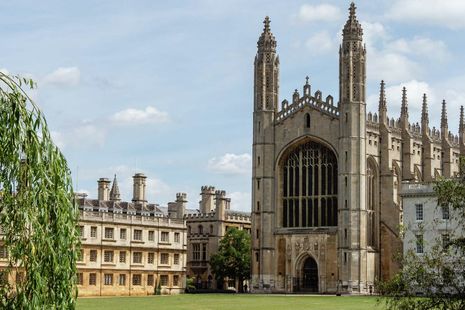Light News – Week 2: Anglo-Saxon graves, exciting new festivals, COVID-19 transmission breakthroughs, and Netflix documentaries
Varsity gives you the low-down on some of the other news you may have missed this week

King’s College excavate extensive medieval burial ground
An archeological dig at Croft Gardens has unearthed an extensive medieval burial ground. King’s College, who plan on building new graduate accommodation at the site, conducted an archeological investigation of the site with a team from Albion Archeology.
They have found over 60 graves, dating mostly from from the early Anglo-Saxon period (c. 400–650 CE).
The burials were furnished with “grave goods including bronze brooches, bead necklaces, glass flasks, weapons, and pottery.” This burial style is associated with the Roman period but radiocarbon dating of the remains is yet to confirm this. King’s hope that the carefully excavated graves “will provide detailed and rich information about dress, burial habits, and health and disease of the community.”
Dr Caroline Goodson, King’s Fellow and University Senior Lecturer in Early Medieval History, said that “the excavation of this cemetery provides an outstanding opportunity to explore very early medieval Britain.”
New Cambridge festival will explore the University’s research
The University of Cambridge have announced that the brand new Cambridge Festival is set to take place between 26 March and 4 April this year.
The Festival, which is replacing the Cambridge Science Festival and the Cambridge Festival of Ideas, will be completely free! It will have four themes: Society, Health, Environment and Explore.
📅 Here's a date for your diary: join us at the inaugural #Cambridge Festival from Friday 26 March!
- Cambridge University (@Cambridge_Uni) January 23, 2021
Enjoy a uniquely eclectic mix of over 350 FREE online events and activities for all the family. Full programme coming soon! https://t.co/Y4ef4IYOa0@Cambridge_Fest #camfest pic.twitter.com/hIEgmSOJkW
With over 350 events including panel discussions and film premieres, the topics of the Festival will aim to cover Cambridge research across these four themes. It will even offer activities that families can try in the comfort of their own home.
Dr Lucinda Spokes, Head of Public Engagement, said that the festival team are “excited to welcome people from around the world”, since the Festival’s online format will facilitate a wider reach.
Is social distancing enough?
Recent research has suggested that social distancing measures are “inadequate” without good ventilation and protective face masks.
Researchers from the University of Cambridge and Imperial College London have used mathematical models to quantify the role of ventilation in different indoor spaces.
In poorly-ventilated spaces, #COVID19 is far more likely to spread through talking than through coughing, according to a team from @Cambridge_Eng.
- Cambridge University (@Cambridge_Uni) January 20, 2021
They've developed a free online tool to help calculate the risk of airborne transmission. https://t.co/ZUBoiid6jf
According to the researchers, in poorly ventilated areas, the accumulation of small droplets expelled through prolonged talking is more likely to spread the virus than through coughing.
In light of this finding, the researchers have developed a tool called Airborne.cam which will help people to “adapt their day-to-day activities and surroundings in order to suppress risk”, says co-author Savvas Gkantonas.
The tool is “now a requirement for any higher-risk spaces at the University”.
The afterlife, Netflix and Cambridge University combine forces
Netflix researchers have reportedly searched the Cambridge University Library archives for their new series, Surviving Death.
Netflix explored the archives of the Society for Psychical Research (SPR), which was founded in 1882 by scientists, philosophers and academics who wanted to investigate the idea of psychic activity scientifically.
What happens after we die?#SurvivingDeath is a new documentary series that explores the possibility of an afterlife. It features the Society for Psychical Research @SPR1882 archives held at Cambridge University Library @theUL.
- Cambridge University (@Cambridge_Uni) January 10, 2021
Now streaming on @netflix.pic.twitter.com/dBm98svEqi
The SPR was a popular society with notable members such as Sir Arthur Conan Doyle. Their archives are extensive, containing items which the society believed to be evidence of psychic activity such as spirit photographs and seance ectoplasm.
The Netflix series, which is currently streaming online, aims to explore the question of an afterlife with an unbiased stance.
 News / Colleges charge different rents for the same Castle Street accommodation2 March 2026
News / Colleges charge different rents for the same Castle Street accommodation2 March 2026 News / News in Brief: waterworks, wine woes, and workplace wins 1 March 2026
News / News in Brief: waterworks, wine woes, and workplace wins 1 March 2026 News / Climate activists protest for ‘ethical careers policy’1 March 2026
News / Climate activists protest for ‘ethical careers policy’1 March 2026 News / Angela Merkel among Cambridge honorary degree nominees27 February 2026
News / Angela Merkel among Cambridge honorary degree nominees27 February 2026 News / Private school teacher who lied about Cambridge degree barred from teaching27 February 2026
News / Private school teacher who lied about Cambridge degree barred from teaching27 February 2026








